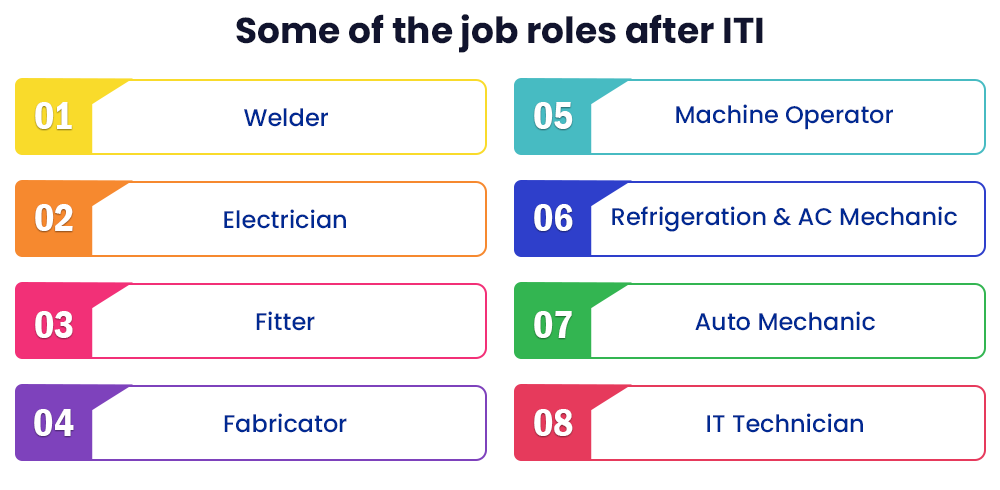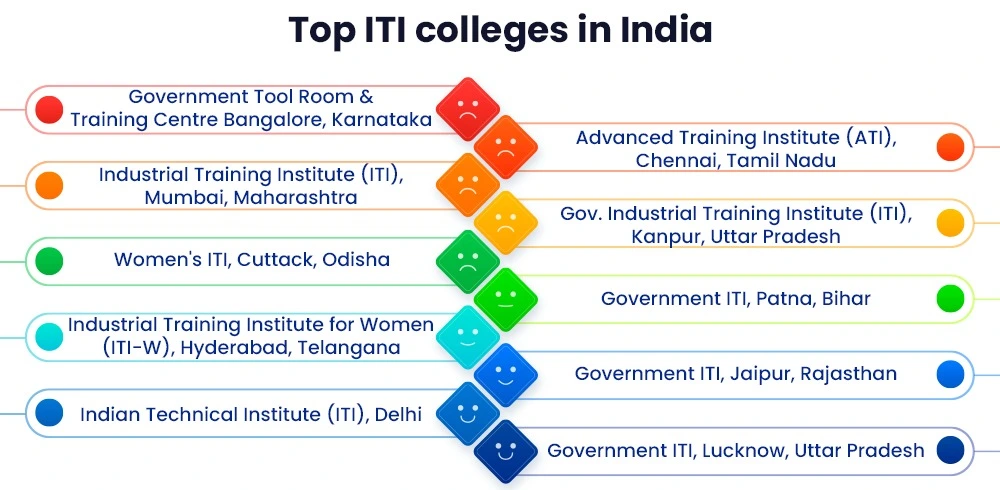The Best ITI Courses After 12th in India: A Guide for Boys and Girls
After completing the 12th grade in India, selecting the appropriate Industrial Training Institute (ITI) course can have a big impact on one’s professional path. A variety of sectors and hobbies are catered to by many ITI courses for boys and girls seeking vocational training. Fields like electrician, fitter, welder, mechanic (automotive and diesel), computer operator and programming assistant (COPA), plumber, carpenter, and more are covered in the finest ITI courses after the 12th grade. Two year-long courses provide theoretical and practical instruction in particular trades. The program places a strong emphasis on the technical know-how, practical experience, and skill development that are necessary for employment in a variety of industries, including manufacturing, construction, IT, and more. ITI courses are an excellent choice for both boys and girls looking for immediate employment opportunities or looking to build a solid foundation for future career advancements in India’s dynamic job market because of the courses practical nature, which enables students to quickly enter the workforce or pursue higher education.
What is ITI?
Industrial Training Institutes, or ITIs for short, are vocational training facilities to offer technical instruction in a range of trades. These educational institutions provide two year programs that give students hands-on experience in a variety of trades, including mechanics, electricians, plumbers, welders, and more.
ITIs emphasize improving employability through providing practical instruction, academic understanding, and industry exposure. They are essential in helping students become employable in a variety of industries by bridging the knowledge gap between academia and industry standards. The curriculum places a strong emphasis on hands-on learning, workshops, and apprenticeships to make sure graduates have the skills needed to make valuable contributions to the workforce. ITIs play a crucial role in developing a skilled labor force that meets the demands of the dynamic industrial environment.
How do I get admission to ITI?
A few processes are involved in getting admitted to an Industrial Training Institute (ITI). Candidates must first determine which ITI offers courses appropriate for their background and areas of interest. Generally speaking, candidates must have earned at least a 10th-grade diploma or equivalent from an accredited board. The application form must then be obtained, either online or from the relevant ITI campus. It is essential that you carefully fill out the form and attach any required documentation, including passport-sized photos, identification documents, and educational credentials.
While some ITIs only accept applicants based on merit, others may require applicants to take an entrance exam. Upon completion of the screening process, candidates who are selected are contacted, and they have a deadline to confirm their admission by paying the required costs. Furthermore, candidates might also have to pass a medical fitness exam. Securing admission to an ITI requires careful research and meeting deadlines, as each ITI may have unique admission requirements and procedures.
What are the courses of ITI?
Industrial Training Institutes (ITIs) provide a wide selection of courses in several subject areas. Students looking for specific trade-related knowledge and specialized skills are catered to by these vocational courses. Electricians, fitters, welders, plumbers, machinists, mechanics, carpenters, computer operators, electronics mechanics, and many more trades are covered in the courses offered by ITIs. These courses, which range in length from 0.6 months to 2 years, emphasize both theoretical knowledge and practical instruction. The curriculum strives to give students industry-relevant skills to work in manufacturing, construction, electronics, and information technology, among other industries. ITI courses place a strong emphasis on technical proficiency, guaranteeing graduates are skilled in their fields of study and improving their marketability.

Furthermore, some ITIs work with businesses to provide specialized programs that are in line with industry needs, which increases students’ access to real-world experience and increases their chances of landing jobs or starting their businesses.
What are the best colleges for ITI?
Generally speaking, “ITI” refers to Industrial Training Institutes, which are Indian educational establishments that provide vocational instruction in a range of trades. It may not be applicable to rank “colleges” specifically for ITIs, though, as ITIs are more like vocational training centers than traditional colleges or universities. However, several well-known ITIs in India are well-known for their high-caliber instruction and resources.

Examples of these include the Government ITI in Mumbai, the Government ITI in Bangalore, and the Government Tool Room & Training Centre (GTTC) in Bangalore. These schools frequently provide courses in a range of trades, such as mechanics, electricians, welders, and more, giving students the hands-on training and credentials needed to get jobs in various industries.
To further assist in choosing the best ITIs based on individual preferences and career goals, factors such as industry collaborations, faculty expertise, infrastructure, and placement opportunities should be taken into account.
What is the ITI Future Scope?
Industrial Training Institutes (ITIs) provide vocational training to give people the hands-on skills they need to work in a variety of trades. ITIs have a promising future because of several factors. First, there is an increasing need for skilled workers in all industries. The demand for technicians, mechanics, electricians, and other qualified professionals with practical experience is rising as automation and technology progress. ITIs are essential in meeting this demand because they offer industry-specific certifications and specialized training.
Furthermore, the government’s initiatives and industry partnerships seek to improve the quality of ITI education, increasing the employability of graduates. In addition, the emphasis on fostering entrepreneurship among ITI graduates extends their prospects beyond conventional employment through skill development initiatives and financial assistance programs.
Given the ever-evolving nature of industries and the growing focus on practical skills, the potential of ITIs seems bright, providing a route for people to land secure jobs and make substantial contributions to a range of industries.
How do I get a job after ITI?
Following an Industrial Training Institute (ITI) program, people have several options for finding employment. First and foremost, it’s helpful to draft a strong CV that highlights the knowledge and abilities you’ve gained, your certifications, and the hands-on training you received in the ITI course. Engaging with industry professionals, past instructors, and peers can yield valuable leads and referrals. Networking is crucial in this regard.
Job searchers should actively look for positions on company websites, online job portals, and recruitment firms that specialize in positions specific to their trade. Furthermore, taking into account internships or apprenticeships improves skills, expands employability, and provides real-world experience. After completing an ITI program, one’s chances of getting hired can be greatly increased by staying current with industry trends, upgrading skill sets with additional coursework or certifications, and demonstrating a willingness to learn and adapt.
In conclusion, enrolling in an ITI course after the 12th grade can be a wise and fulfilling choice that will equip students with marketable skills and open doors to a wide range of career options in a variety of industries. Through appropriate course selection, the acquisition of hands-on experience, and continued industry awareness, ITI graduates can establish prosperous careers and make valuable contributions to the labor force.
Read Also
Download Free Piping PDF for Interview Preparation
Know more about Heat Exchanger
Download Free Piping PDF for Interview Preparation
What is gasket and their types
What is a valve and its types?


For those seeking the Best ITI College in Jaipur, Bhushan ITI is the ideal destination! Offering cutting-edge infrastructure, experienced instructors, and excellent placement opportunities, it stands out as a top institute for world-class technical education and career growth.
https://bhushaniti.com/
https://maps.app.goo.gl/jNctfZmqVbzYL2ABA
For those seeking the Best ITI College in Jaipur, Bhushan ITI is the ideal destination! Offering cutting-edge infrastructure, experienced instructors, and excellent placement opportunities, it stands out as a top institute for world-class technical education and career growth.
https://bhushaniti.com/
https://maps.app.goo.gl/tX41xkuowuQR9229A
Searching for the best ITI college in Jaipur? Bhushan ITI stands out with experienced faculty, top-notch education, and excellent placement opportunities. Secure your future with the best—enroll today!
https://bhushaniti.com/
https://maps.app.goo.gl/j2TJbK1RJnMcJY2y6